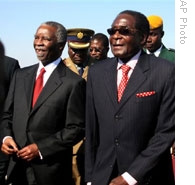VOA标准英语2008年-Zimbabwe's Interparty Negotiations Resume in Se(在线收听)
 |
| South African President Thabo Mbeki (l) is welcomed by his Zimbabwean counterpart Robert Mugabe in Harare, 30 Jul 2008 |
Insiders close to the Zimbabwe talks believe there could be a power-sharing agreement on the table by Friday.
The negotiations paused last week as negotiators reported back to party principals. The talks mediator, South African President Thabo Mbeki, has insisted negotiations be conducted in secret and many people in rural Zimbabwe do not even know talks about their future are under way.
There appears to be some consensus emerging in public statements from both ZANU-PF negotiators and MDC leader Morgan Tsvangirai that President Robert Mugabe will have a role to play in whatever emerges from the negotiations.
The MDC, which won the March parliamentary elections, says it wants a short-lived transitional authority, which it would control, to emerge from negotiations. The authority would produce a new constitution leading to fresh elections within about two years.
Mr. Tsvangirai, who received the most votes in the March presidential election, says Mr. Mugabe should have an honorable exit from power, which he has held since Zimbabwe's independence in 1980.
But Mr. Mugabe, the sole candidate in a discredited run-off election, has been sworn in for a further five years in power. His ZANU-PF is calling for lifting of western sanctions, which are mostly visa bans against individual ZANU-PF leaders and a few that restrict western citizens from doing business with some ZANU-PF businesses.
ZANU-PF set lifting of sanctions as a prime reason for going into negotiations with the MDC.
But western diplomatic sources in Harare say Washington and the European Union remain resolute that targeted sanctions against ZANU-PF will only be lifted if the talks lead to a power-sharing agreement that reflects the will of the people as expressed in elections on March 29.
Zimbabwe has been without a government since parliament was dissolved the evening before the elections. Meanwhile, Zimbabweans suffer with little food available, collapsed social services, and a chaotic financial system that has produced annual inflation of at least 2.2 million percent.